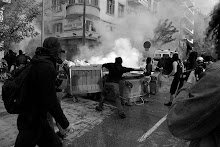PRESENTATION for a recent meeting about armed struggle in Barcelona
History is always told by the victors. There is no neutrality or objectivity about it. Our histories are saved in memories; making it easy for our reality to be negated, extinguished, manipulated or just forgotten. History and the powers that be always had and still have a concrete aim, able to monopolize the “truth” to continue to dominate the present... and not just the power of the state but the same power roles inside social struggles. Because of this, we want to give voice to the women and their self-management, bring them out of the shadows, and give them the space that they belong to, contrasted against the patriarchal version of the occidental man.
Knowing that this is not a new topic, we still see it as important to reclaim our history and our collective memory, we see the need to organize another series of talks-debates about armed struggles in the 60s, 70s and 80s, because there are still many things to say.
It’s not only about memorializing the struggle against capitalism and the oppressors´ system by these women and men. Today many of us find ourselves on a one-way-street or just don’t really know how to get out because of a lack of strategic and possible practices. Looking around, we see people who fought with us yesterday and today they lean toward conciliatory positions with the enemy. The capitalist democracy wants to envelop our comrades, to exchange the “struggle from the outside” for the “struggle from the inside” of the system. Still some remain; stating, “The war started long before and there is no friendship that is not political.”
So we find ourselves; with this view, in Barcelona in the beginning of 2010. Against this complex situation we see it necessary, again, to look toward our antecedents of the struggle; these people who lived the lasting intensity of ´68 and the beginning of the 70's. Because; many times, if we do not have first-person accounts, we only receive some shreds of what was the armed struggle: blood, bullets and silence. A silence that inadvertently invisibilizes and makes it difficult to share experiences from one generation to the other.
But, we don’t want to listen children’s stories. We want to understand the decisions that were taken and the path followed by these women and men. We want to adapt the tools of these struggles, to the ones of today. We want to understand victories, mistakes, and triumphs; but, without judging them, so that we can use them in solidary self-critique. We don’t want to fall in the trap of mystifying what was armed struggle; conversely we want to see clearly what it was, with all its differences and common ground. We want to analyze the various contexts of the moment and learn from internal forms of organization and practices.
Subscribe to:
Post Comments (Atom)




No comments:
Post a Comment